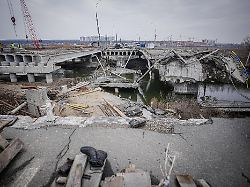Germany vs. Poland
Is there a competition to rebuild Ukraine?
By Andrea Sellmann and Mary Abdelaziz-Ditzow
4/1/2023 3:27 p.m
Relations between Germany and Poland are politically difficult, but trade recorded a new record last year. But what if the reconstruction of Ukraine is pending? Is the next quarrel with our neighbors looming?
Since the beginning of the war, Poland has stood very close to Ukraine: the country not only provides humanitarian aid for refugees, but is also making progress in the delivery of fighter jets across the EU. Polish Prime Minister Mateusz Morawiecki leaves no doubt that Ukraine must hold out until Russian troops withdraw. In addition to humanitarian and military support, Poland is also focusing on the reconstruction of Ukraine.
A scenario that the Eastern Europe expert Nils Kreimeier has in mind: “There was a big reconstruction summit in Warsaw recently,” he says in the podcast “Wirtschaft Welt & Weit”. German and Polish companies have expressed their interest in getting involved in the reconstruction of Ukraine after the Russian troops have withdrawn. It’s not just about helping the devastated country, but also about orders. “In the best-case scenario, that could trigger healthy competition,” says Kreimeier, who has known German-Polish relations for the business magazine Capital for years. In the worst case, however, a new political conflict threatens.
Political relations between Germany and Poland are already shaky: with its proximity to Russia, Berlin would have prepared the ground for Putin’s war of aggression in Ukraine, according to criticism from Poland. Germany had relied on a strategic partnership with Putin for too long and simply ignored warnings from Central and Eastern European countries. Against this background, the economic ties act like a bond that holds both countries together even in politically difficult times.
More than Germany’s “extended workbench”.
Poland is now Germany’s fifth largest trading partner and, as a direct neighbor, an important partner. German-Polish foreign trade reached a new record last year with a value of over 167 billion euros. For Kreimeier, the country has long been more than “the so-called extended workbench for German companies that have set up production facilities there”. The expert knows that the quality of the work has steadily increased. In the meantime, German companies have also had high-quality research work carried out in Poland.
But the Polish perspective is different: Individual positive examples are not enough for many people to be on par with Germany. Piotr Buras, head of the Warsaw office of the “European Council on Foreign Relations”, observes this: According to Buras, the technologies developed, i.e. the future of the economy, are still more likely to be located in Germany. “We would very much like to move up this value chain,” explains Buras, “but the question is whether we can do it and what that means for German-Polish relations.”
For him, however, the reconstruction of Ukraine after the end of the war, hopefully soon, does not pose a major threat to German-Polish relations: For him, this challenge has dimensions that even surpass the Marshall Plan – and offers enough space for German and Polish companies to participate equally to supply orders.
What does Germany have to do in order to still play an important role in the economic world of tomorrow? Who are we dependent on? Which countries benefit from the new world situation? Mary Abdelaziz-Ditzow discusses this in the ntv podcast “Wirtschaft Welt & Weit” with relevant experts.
You can find all episodes in the ntv app or wherever there are podcasts: at RTL+ music, Apple Podcasts, Google Podcasts, Spotify, Amazon Music or deezer. For all other podcast apps, you can use the RSS feed.
